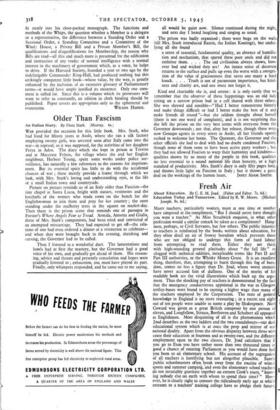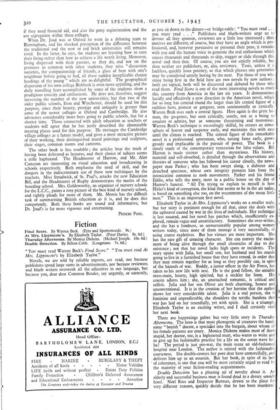Fresh Air
MANY teachers, particularly women, must at one time or another have simpered at the compliment, " But I should never have thought you were a teacher." As Miss Strudwick enquires, in what other profession would a similar remark be taken as a compliment? Hang- men, perhaps, or Civil Servants, but few others. The public injustice to teachers is reinforced by the books written about education, for they often distil an air of frowsy boredom which prevents those who are not obliged to undergo this form of hard labour from attempting to read them. Either they are thick with high-sounding general platitudes about " the full life " or clogged with technical oddities, inexplicable terms like Part II and Part III authorities, or the Whisky Money Grant. It is an excellent thing, therefore, that, attempting to burst through this fog of bore: dom, comes no less a figure than Dr. Joad, whose worst enemies have never accused him of dullness. One of the merits of his readable book are the vivid illustrations which back up the argu- ment. Thus the shocking pay of teachers is demonstrated by the fact that the emergency conductresses appointed in the war to Glasgow trolley-buses were found to be earning a higher wage than many of the teachers employed by the Corporation. The state of general knowledge in England is no more reassuring ' • in a recent test eight out of ten people were unable to name a play by Shakespeare. Noel Coward was given as a great British composer by one person in eleven, and Longfellow, Strauss, Beethoven and Schubert all appeared as Englishmen. Most disquieting of all is the phenomenon which Joad describes as the two ladders and the two roundabouts—onr dual educational system which is at once the prop and mirror of our national duality. Apart from the obvious disparity between those who cease their education at fourteen and at twenty-two, and the different employment open to the two classes, Dr. Joad calculates that if you go to Eton you have rather more than two thousand times as good a chance of entering Parliament as you would have done had you been to ati elementary school. His account of the segregation of all teachers is horrifying but not altogether plausible. Sure'y public schoolmasters often break away from the routine of winter sports and summer camping, and even the elementary school teachers do not invariably gravitate together on earnest Cook's tours, " know- ing nobody else on earth with whom to spend their time? " How ever, he is clearly right to censure the ridiculously early age at which entrants to a teachers' training college have to pledge their future,
if they need financial aid, and also the petty regimentation and the sex segregation within these colleges.
When Dr. Joad was at Oxford he went in a debating team to Birmingham, and his shocked perception of the difference between the traditional and the new or red brick universities still remains vivid. In the latter, he says, the students are learning how to earn their living rather than how to achieve a life worth living. Moreover, living dispersed with their parents, as they do, and not on the premises in common with other students, they miss "discussion societies, the companionship of friends, a glass of beer with one's neighbour before going to bed, all these sudden inexplicable chance herdings of the young " which are so delightful. The geographical dispersion of his own college Birkbeck is even more appalling, and the daily travelling feats accomplished by some of the students show a prodigious tenacity and enthusiasm. He does not, therefore, suggest increasing the number of the new universities, but that two of the older public schools, Eton and Winchester, should be used for this purpose, since their beauty, prestige and antiquity is greater than some of the newer colleges at Oxford and Cambridge. He also advocates considerably more boys going to public schools, but for a shorter time. Those connected with adult education as teachers or students will agree that he has justly described the abominable meeting places used for this purpose. He envisages the Cambridge village colleges as a future model, and gives a most attractive picture of their working, their distinguished mural paintings and sculpture, their stages, common rooms and canteens.
The other book is less readable ; the articles bear the mark of having been delivered as lectures, and their choice of subject seems a trifle haphazard. The Headmaster of Harrow, and Mr. Alan Cameron are interesting on visual education and broadcasting in schools respectively. Both emphasise the need of skill, and the dangers in the indiscriminate use of these new techniques by the teachers. Miss Strudwick, of St. Paul's, attacks the new Education Bill, and the Headmaster of Rugby demonstrates the merits of the boarding school. Mrs. Goldsworthy, an organiser of nursery schools for the L.C.C., paints a rosy picture of the best kind of nursery school, and rightly pleads for more of them. Mr. Morris has the difficult task of summarising British education as it is, and he does this competently. Both these books are sound and informative, but Dr. Joad's is far more vigorous and entertaining.
PHOEBE POOL.



























 Previous page
Previous page